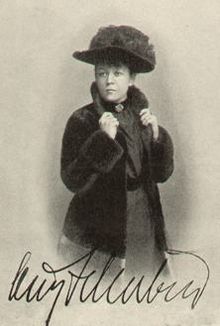This article has multiple issues. Please help improve it or discuss these issues on the talk page. (Learn how and when to remove these messages)
|

Aloisia Kirschner (17 June 1854 – 10 February 1934) was an Austrian novelist, born in Prague and favorably known under her pseudonym Ossip Schubin, which she borrowed from the novel Helena by Ivan Turgenev.
Brought up on her parents' estate at Lochkov, she afterward spent several winters in Brussels, Paris, and Rome, receiving there, undoubtedly, many inspirations for her clever descriptions of artistic Bohemianism and international fashionable society, which were her favorite themes. An uncommonly keen observer, her great gift for striking characterization, frequently seasoned with sarcasm, is especially apparent in her delineations of the military and artistic circles in Austria-Hungary.
She died in 1934 at Košátky Castle [cs], Bohemia.
Works
Her works are of unequal quality, the earlier being the best. The more important of her novels and stories include:
- Ehre (1882; seventh edition, 1893)
- Die Geschichte eines Genies: Die Galbrizzi (1884)
- Unter uns (1884; fourth edition, 1892)
- Gloria Victis (1885; third edition, 1892)
- Erlachof (1887)
- Es fiel ein Reif in der Frühlingsnacht (fourth edition, 1901)
- Asbeïn, aus dem Leben eines Virtuosen (1888; fourth edition, 1901), and its sequel, Boris Lensky (1889; third edition, 1897), probably her most meritorious work
- Unheimliche Geschichten (1889)
- O du mein Oesterreich! (1890; third edition, 1897)
- Finis Poloniœ (1893)
- Toter Frühling (1893)
- Gebrochene Flügel (1894)
- Die Heimkehr (1897)
- Slawische Liebe (1900)
- Marska (1902)
- Refugium peccatorum (1903)
- Der Gnadenschuss (1905)
- Der arme Nicki (1906)
- Primavera (1908)
- Miserere nobis (1910)
External links
![]() Media related to Ossip Schubin at Wikimedia Commons
Media related to Ossip Schubin at Wikimedia Commons
- Works by Ossip Schubin at Project Gutenberg
- Works by or about Ossip Schubin at the Internet Archive
- Works by Aloisia Kirschner at LibriVox (public domain audiobooks)

- "Our Own Set", review in Neglected Books Page, November 2010
This article incorporates text from a publication now in the public domain: Gilman, D. C.; Peck, H. T.; Colby, F. M., eds. (1905). New International Encyclopedia (1st ed.). New York: Dodd, Mead. {{cite encyclopedia}}: Missing or empty |title= (help)
This Austrian biographical article is a stub. You can help Misplaced Pages by expanding it. |